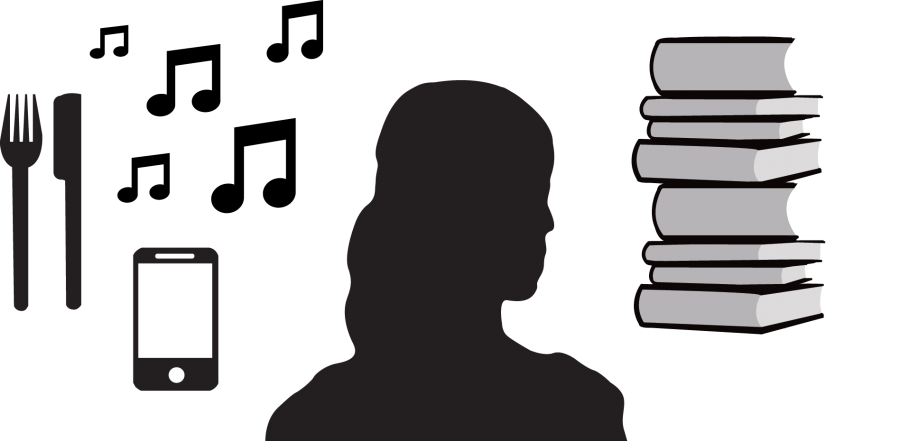Multitasking affects efficiency, quality of homework
December 10, 2015
Listening to music, eating or using a cell phone is an easy escape from the potential monotony of homework, but multitasking can be detrimental to the quality and efficiency of students’ work, despite making the job more pleasurable.
“I listen to music, I text with my friends constantly, and I eat,” junior Sarah Hong said. “With songs with a really good beat I sort of work to the beat. Texting my friends, half the time I’m texting about homework, so it’s kind of more productive than social leisure.”
Ninety-eight percent of student respondents admitted to multitasking while doing homework, according to an online Broadview survey.
Despite its pleasurable effects, listening to music with lyrics slows down the learning process while doing homework, making it more difficult to recall information and decreasing efficiency, according to Academic Support Director Betsy Pfeiffer.
“It becomes tricky when both tasks have to access the same part of the brain,” Pfeiffer said. “If you’re trying to read and you’re listening to songs with lyrics in it, they’re both accessing the language part of your brain and it just makes it a lot slower to be able to process what you are reading. If listening to music is helpful for you, listen to music without lyrics.”
Although lyrical music may inhibit a student’s learning, music without words does not access the part of the brain that comprehends language, known as the Wernicke’s area, and does not interfere with study habits.
“When I’m writing English papers, I don’t listen to music because I tend to type what I’m listening to instead of what I want to say in my paper,” Hong said. “So that’s the time I don’t listen to music, or when I’m reading.”
When the learning process is decelerated by the brain trying to focus on two tasks at once, students are prone to making more mistakes than if they were focusing on just one task.
“Sometimes you have so much to do, you feel like multitasking can get it done quicker,” Pfeiffer said. “Some studies have shown that students make more mistakes than they normally would make because when they are shifting between two tasks, your brain has to take time to refocus on the task each time you go back to it. It is slowing down your cognitive processing and interrupting the continuity of learning.”
Texting while doing homework can also be a harmful form of multitasking, as it takes the brain longer to switch between texting and studying than students may assume.
“So let’s say I want to text with my friend, at the same time I have to write an essay,” Pfeiffer said. “When I go back to the essay, my brain has to actually go back and think about what I was doing before. You don’t think it takes away from your concentration because it happens so quick, but your brain is having to refocus on what you were doing before the quick text, so it’s taking you longer to actually complete the essay. ”
While most media-related forms of multitasking can be distracting to students working on their studies, some forms can benefit their focus and concentration on homework.
Eating while doing homework, although technically a form of multitasking, does not take away from a student’s language understanding, and can keep a student focused and less bored without causing a loss of attention.
“With eating, it helps refuel my brain so I can keep working,” Hong said. “I need those constant little breaks because I can’t sit at my desk for hours straight.”
Forty-seven percent of respondents in the Broadview survey claimed that multitasking, mainly stating eating or listening to music, either does not have a drastic effect on their homework quality or efficiency, or benefits their homework habits by helping them enjoy homework and preventing boredom.
“It works positively because I feel like I’m getting fun out of doing the work,” one respondent wrote. “It’s kind of like when you give a dog a treat at the vet, the dog may not like the vet but a treat can make his or her experience a lot more positive and will encourage the dog to want to come back. With this type of attitude I look forward to my work and therefore I complete it faster.”
Students involved in extracurricular activities that end late into the day have only a small window of time for both homework and other tasks.
“By the time I get a chance to do it, I don’t have time to do much else,” another responder wrote. “There is only so much time in the day, and I can hardly get all my work done at a decent hour, even when I sit down and start working right when I get home. I don’t have time to take many breaks, so I eat at the same time, and I like to listen to music. Music helps keep me awake and active.”
If a student’s multitasking habits are damaging to their academic career, Pfeiffer recommends finding better strategies and being more conscious of boredom while allowing occasional breaks to regain focus.
“Sometimes it’s okay to walk away from something and come back to it if you feel that you are not being productive, because in that time frame you’re not getting anything done anyway,” Pfeiffer said. “The key is to really figure out how you best study, when you are most productive and to be honest with yourself on what you want to accomplish.”










